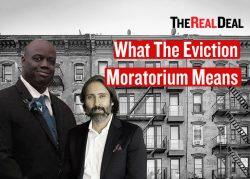Tenants in New York will have to do more than claim financial hardship under the state’s eviction moratorium, the Supreme Court ruled Thursday. They will have to prove it.
The nation’s high court, in a 6-3 ruling, struck down a provision of the moratorium that allows tenants to self-report Covid-related financial hardship with a form. Instead, court evidence and affirmation will be required going forward, the New York Times reported.
It’s not clear how many people will be affected, especially with the moratorium due to end Aug. 31. But some legislators are pushing to extend it, and when Kathy Hochul takes over as governor Aug. 24, she will be under pressure to do so. More than 830,000 households in the state are behind on rent to the tune of $3.2 billion.
In light of the ruling Thursday, Hochul said she would work to “strengthen the eviction moratorium legislation.” She plans to run for a four-year term next year.
Read more


It is also possible that the recently tweaked national eviction moratorium will protect tenants. The Centers for Disease Control’s moratorium applies to areas hard hit by the pandemic. All of New York City now qualifies, as does 90 percent of the country.
That moratorium is expected to remain in place until October. But a legal challenge has been filed against it as well, and the Supreme Court could well strike down the policy.
Meanwhile, New York state continues to struggle doling out rent relief aid. As of a few days ago it had distributed just $100 million out of a $2.7 billion fund.
[NYT] — Holden Walter-Warner
